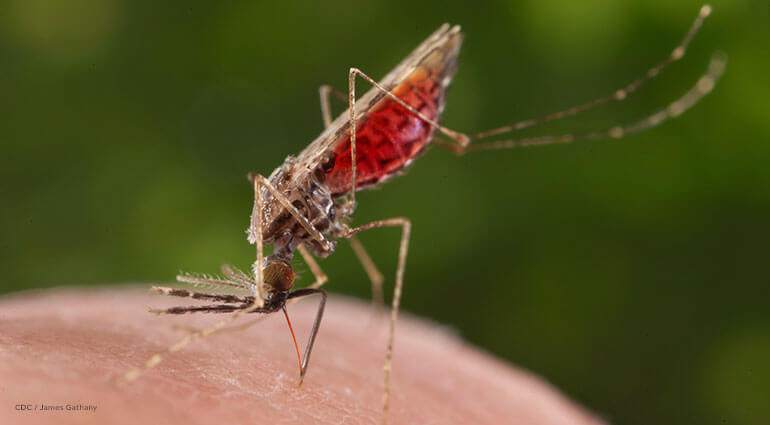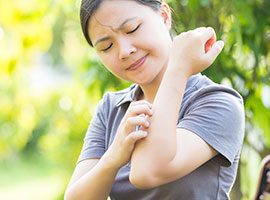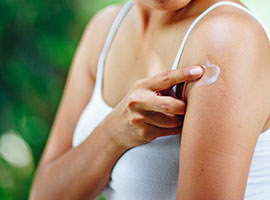
MALARIA: CAUSES, SYMPTOMS AND PREVENTION
Malaria is a life-threatening disease transmitted through the bites of infected mosquitoes. According to UNICEF, malaria kills one child every 30 seconds—that's approximately 3,000 children every day.1
Malaria is a serious and sometimes fatal disease that is caused by Plasmodium parasites. The parasites are spread to people when they’re bitten by infected female Anopheles mosquitoes, which primarily bite at night.
When the Plasmodium parasite enters the body, it lodges in the liver where it multiplies about 10,000 times. Two weeks later, it bursts into the bloodstream and infects red blood cells.
Malaria is preventable and curable if it is diagnosed and treated promptly. You can help protect your loved ones from mosquitoes that may transmit malaria by learning how to reduce your risk of mosquito bites.
FACTS ABOUT MALARIA
According to the World Health Organization (WHO):2
There were over 200 million cases of malaria in 87 countries in 2017.
Nearly half of the world’s population is at risk of malaria.
The (WHO) African Region was home to 92% of malaria cases and 93% of malaria deaths in 2017.
WHAT ARE THE SIGNS AND SYMPTOMS OF MALARIA?3
According to the Centers for Disease Control and Prevention, malaria cases can be categorized as uncomplicated or complicated (severe), and the symptoms can vary depending on the severity of the infection.
UNCOMPLICATED MALARIA SYMPTOMS
Fever
Chills
Sweats
Headaches
Nausea and vomiting
Body aches
General malaise and weakness
Increased respiratory rate
Enlarged spleen and/or liver
Mild jaundice
COMPLICATED (SEVERE) MALARIA SYMPTOMS
Neurologic abnormalities, including seizures, coma, impairment of consciousness, or abnormal behavior
Severe anemia
Hemoglobin in the urine, which may make the urine look dark
Abnormalities in blood coagulation
Low blood sugar, which may also occur in pregnant women with uncomplicated malaria, or after treatment with quinine
Acute respiratory distress syndrome (ARDS)
Low blood pressure
Acute kidney injury
Hyperparasitemia
Metabolic acidosis
SYMPTOM ONSET & COMPLICATIONS2
According to WHO, some people may develop partial immunity and won’t have any symptoms in areas where malaria is common. In non-immune people, the first symptoms of malaria usually begin 10-15 days after being bitten by an infected mosquito. If not treated within 24 hours, some types of malaria can progress to more severe symptoms and illness, often causing death.
HOW IS MALARIA TREATED?
The goal of malaria treatment is the full and rapid elimination of the parasite from the patient’s blood.4 According to the CDC, the recommended course of treatment depends on a variety of factors, including:5
The parasite species that caused the infection
Where in the world the infecting parasite was acquired
The drug-resistance status of the parasite
The severity of the disease and symptoms
Whether the patient has other illnesses or is pregnant
Whether the patient has any drug allergies or is taking other medications
Since the treatment of malaria is so complex, your doctor will determine the right treatment plan for you.
WHERE IS MALARIA FOUND?2
According to the World Health Organization, nearly half of the world’s population is at risk of malaria. While malaria is most common in sub-Saharan Africa, some countries in the WHO regions of Southeast Asia, the Eastern Mediterranean, the Western Pacific, and the Americas are also at risk of this mosquito-borne illness.
HOW TO HELP PREVENT MALARIA6
LEARN MORE ABOUT MALARIA
-
For more information about this mosquito-borne disease, check out theWorld Health Organization’s Malaria Fact Sheet.
-
For more tips to help protect your home and family from these disease-carrying insects, readHow to Help Get Rid of Mosquitoes.
OUR COMMITMENT TO FIGHTING MALARIA
For over 60 years, researchers at theSC Johnson® Institute of Insect Science for Family Healthhave been studying these biting insects to learn new ways to help protect your family from mosquitoes that may carry malaria.
FIND SOLUTIONS FOR MOSQUITOES
We know how important it is to help prevent mosquito-borne diseases worldwide. That's why we offer a variety of products designed to help you protect yourself and your loved ones from mosquitoes that transmit malaria.
DISCLAIMER
This is provided for your information only and is not intended to diagnose or treat any medical condition. Should you have any symptoms or concerns, please contact your doctor.




